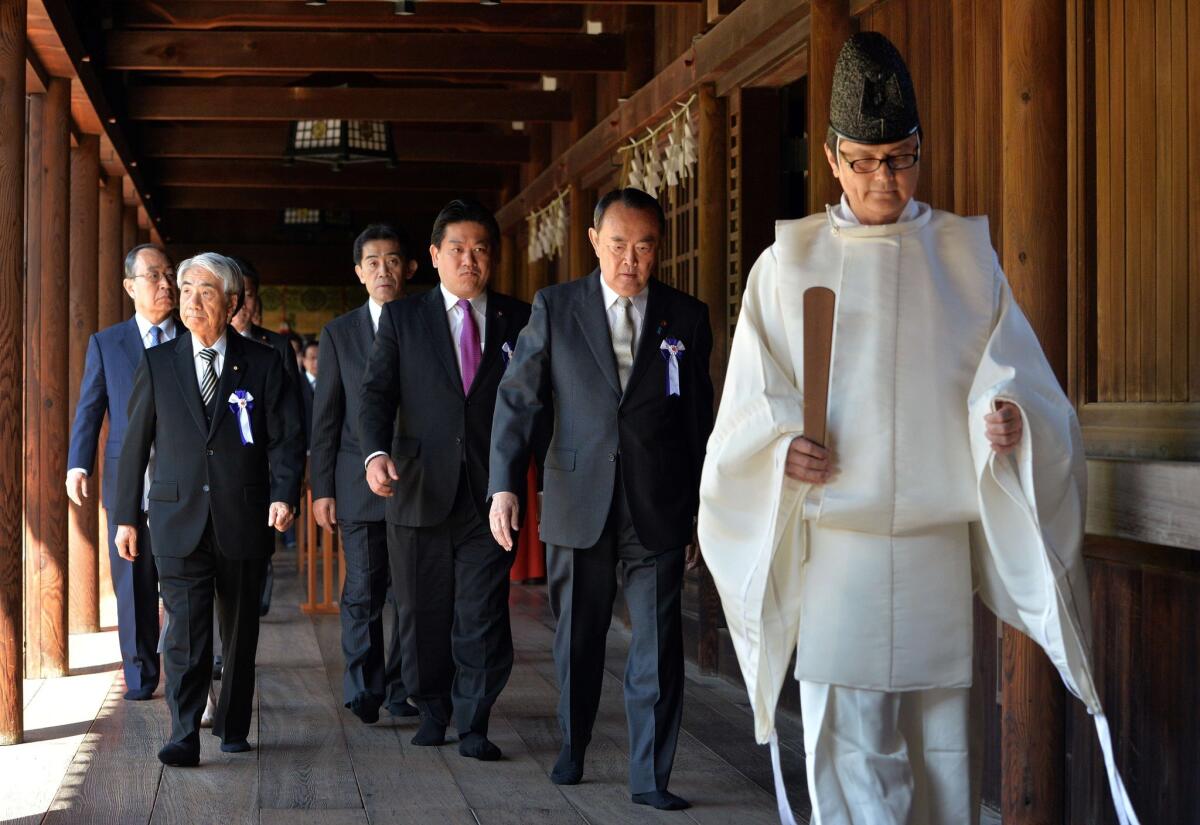Japanese officials’ visits to shrine for war dead put Obama in a bind

TOKYO -- Hiroshi Kyoso says he values Japan’s relationship with the United States highly and feels warmly about Washington’s new ambassador to Tokyo, Caroline Kennedy.
But as the 90-year-old veteran of World War II arrived Wednesday morning to pray at Tokyo’s Yasukuni shrine -- a controversial site that commemorates nearly 2.5 million of Japan’s war dead including 14 top war criminals -- Kyoso said he saw no connection between the shrine and Japan’s ties with America.
If a Japanese leader visits Yasukuni, he said, it’s only natural. “For any country, such a gesture is a given,” said Kyoso, dressed in a light blue jacket.
Yet President Obama -- who touched down in Tokyo on Wednesday evening for a state visit -- may beg to differ.
Four months after Japanese Prime Minister Shinzo Abe visited the shrine, his trip and other attendant gestures continue to roil Japan’s neighbors, including China and South Korea, who see Yasukuni as a symbol of Tokyo’s past aggression. Abe sent an offering to Yasukuni on Monday, and about 150 Japanese lawmakers visited the shrine on Tuesday, though those actions generated less controversy.
The ensuing tensions have complicated U.S. efforts to strengthen ties among its Asian allies, particularly Japan and South Korea, as Washington seeks to bolster its presence in Asia. The growing mistrust between Beijing and Tokyo, meanwhile, has fueled fears of that misunderstandings could lead to a military clash, drawing in the United States.
For the U.S., “it is frustrating because these are not issues Americans are very seized with, and they don’t understand why 70 years after the end of World War II they should be as problematic as they are,” said Charles Morrison, president of the East-West Center in Honolulu. “They’re not going away, and they’re getting worse, not getting better.”
In many ways, Morrison noted, U.S.-Japan ties are better than they have been in a long time. Significant majorities in both countries rate the other very highly in terms of factors such as friendship, support and importance, and the economic rivalry of the 1970s and ‘80s is a distant memory.
But Washington is worried that Tokyo is not “repairing or handling the relationships with neighboring countries very well,” he added. “That puts a lot of pressure on U.S. diplomacy. In the South Korean case, it’s almost like the U.S. has to mediate between the two countries, get them working together with the United States on issues like the North Korean problem.”
Only 46% of Japanese respondents say Abe’s Yasukuni visit was not a good action, according to a survey by a major Japanese newspaper in January. And only a slightly larger group -- 51% -- polled by a Japanese TV network in February felt that Abe’s visit to Yasukuni had strained U.S.-Japan ties.
Almost the same number of people -- 49% -- told the TV network they supported Abe’s coalition government, whose economic policies have been popular at home.
Rodney Armstrong, a foreign affairs analyst and former U.S. diplomat, says that among ordinary Japanese, there may be a certain level of ignorance surrounding historical events, and a general lack of understanding about why Chinese and South Koreans continue to be upset by Abe.
Older Japanese people who experienced the war “do not want to talk about it,” he said, while for younger citizens, Japan’s crimes during the conflict are “not in their textbooks in any detail.”
It was eight years ago that a Japanese prime minister, Junichiro Koizumi, last paid a visit to Yasukuni. That move infuriated Japan’s neighbors, but the stakes were seen by many as not quite as high, said Koichi Nakano, professor of political science at Tokyo-based Sophia University.
Now, though, China has grown into the world’s second-largest economy, bypassing Japan. And Beijing has been asserting its power in the region in other ways, proclaiming an Air Defense Identification Zone over the East China Sea and asserting control over parts of the South China Sea. Japan and China have been tussling over some small islands known as the Senkakus in Japan and the Diaoyus in China.
“There is a bigger risk now of a military combat situation occurring, even by accident, between China and Japan,” said Nakano.
During Obama’s visit, Abe will be looking to the U.S. president for reassurance that the U.S. will protect Japan, including the disputed islands, if they’re threatened, said Unryu Suganuma, a professor at J.F. Oberlin University in Tokyo. At the same time, Beijing hopes to hear that the U.S. will not take any position regarding the sovereignty of the disputed islands, leaving Japan and China to address the issue themselves.
“In the end, neither Beijing nor Tokyo will get what they want to hear from Obama, who might not even mention name of the Diaoyu/Senkaku islands publicly,” predicted Suganuma.
If, as many analysts predict, Obama comes away from the trip with little to show beyond reaffirming the status quo, Washington may be disappointed. But in Japan, as long as the visit doesn’t make Abe look like he has mishandled relations with the U.S., there’s likely to be few consequences.
“People are looking for strong leaders these days, especially in a globalized world when things seem so uncertain,” Morrison said. “You see what Mr. [Vladimir] Putin has done, and it looks problematic vis-a-vis the rest of the world, but he’s wildly popular in Russia.”
“Mr. Abe, by thumbing his nose a bit at countries that continue to criticize … that’s not necessarily going to hurt him.”
Twitter: @JulieMakLAT
Special correspondent Nagano reported from Tokyo and Times staff writer Makinen from Beijing. Staff writer Barbara Demick in Beijing contributed to this report.
More to Read
Sign up for Essential California
The most important California stories and recommendations in your inbox every morning.
You may occasionally receive promotional content from the Los Angeles Times.











